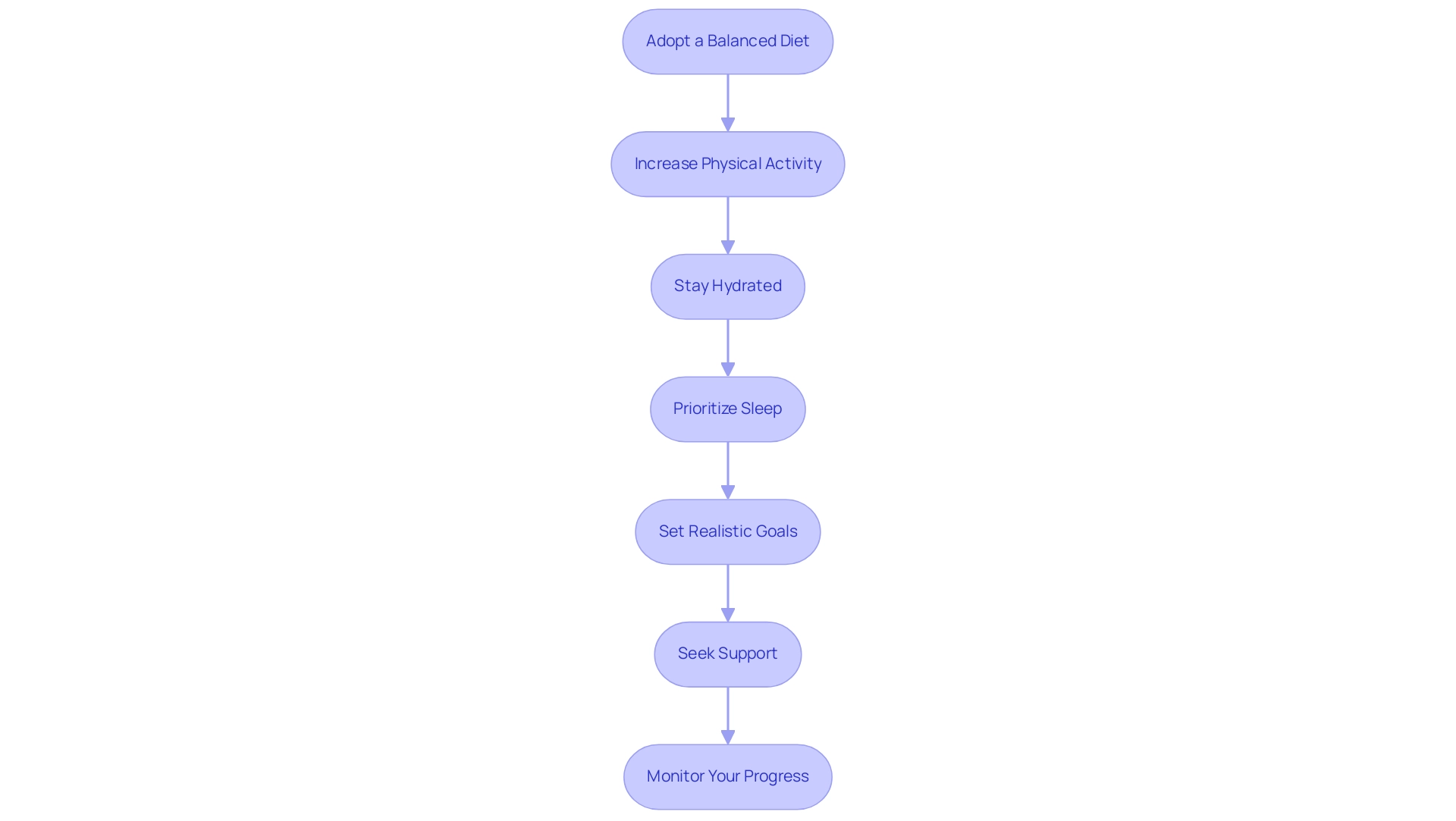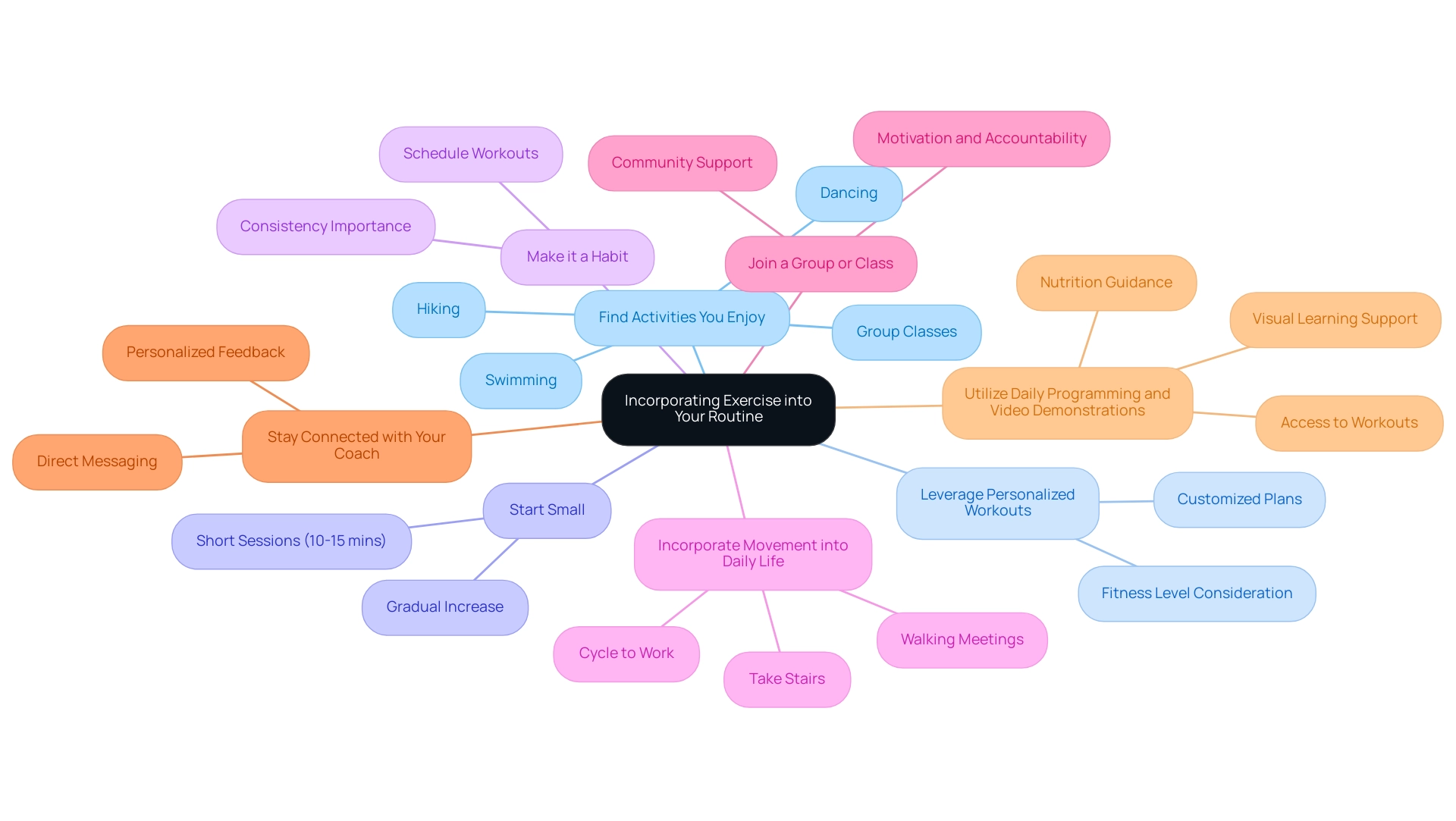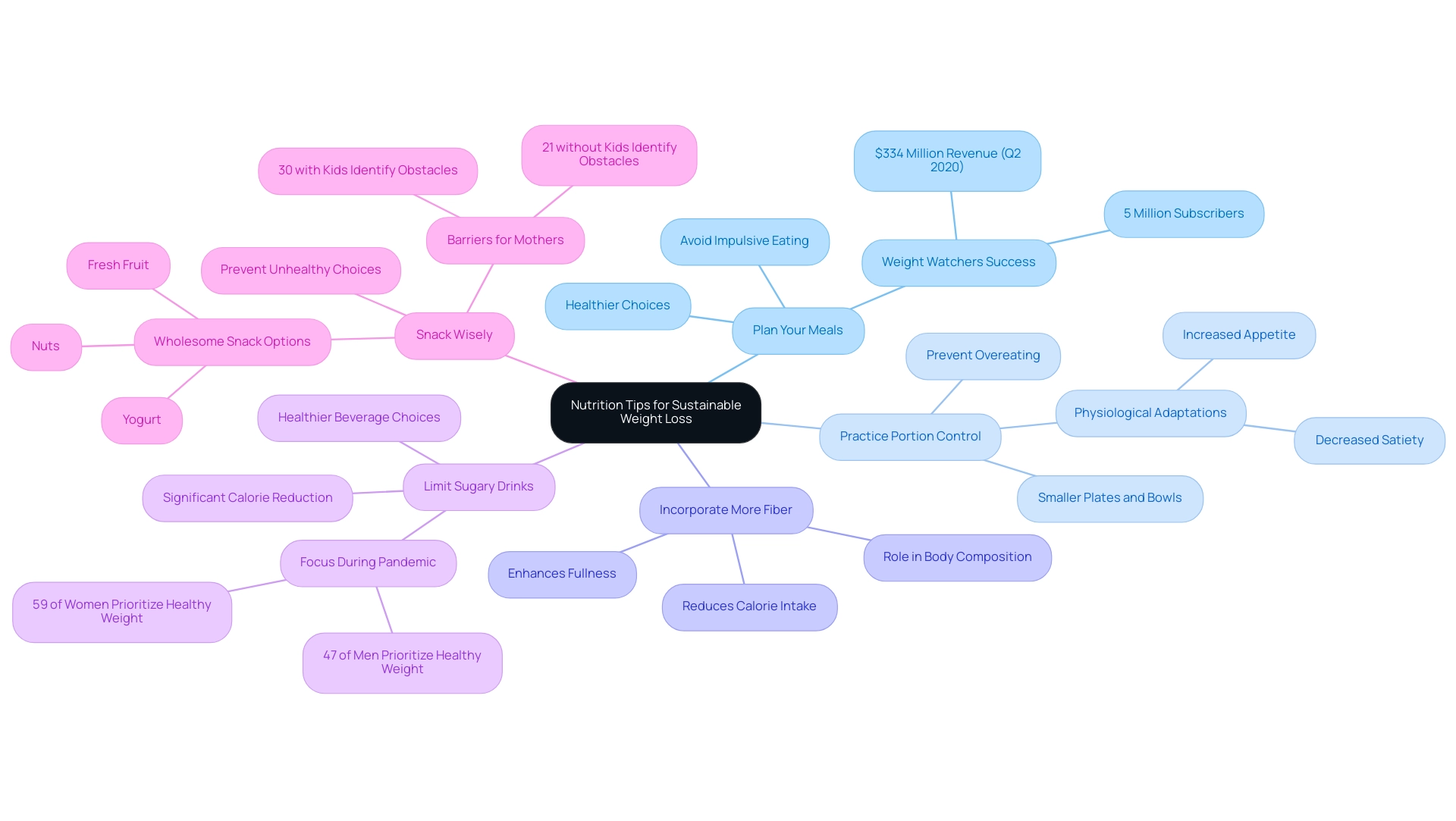Introduction
In a world increasingly aware of the importance of health and wellness, understanding Body Mass Index (BMI) emerges as a crucial first step in promoting a healthier lifestyle. This simple yet powerful metric not only categorizes weight status but also serves as a gateway to identifying potential health risks.
With alarming statistics highlighting the rise of obesity, particularly among children and adults, the urgency for effective strategies to combat this trend has never been more pressing. By prioritizing BMI awareness and incorporating actionable steps into daily routines, individuals can take charge of their health journey, fostering a culture of well-being that resonates within both personal and professional spheres.
Embracing nutrition, exercise, and consistent monitoring can transform lives, creating a ripple effect that enhances motivation and productivity in the workplace. As organizations recognize the value of supporting their teams' health, the call to action is clear: it’s time to champion wellness and cultivate an environment where every individual can thrive.
Understanding Body Mass Index (BMI) and Its Importance
Body Mass Index (BMI) serves as a vital numerical indicator derived from an individual's weight and height, offering a straightforward method to categorize body weight status into underweight, normal weight, overweight, or obesity. A BMI ranging from 18.5 to 24.9 is deemed healthy; however, values below 18.5 signify underweight status, while those exceeding 24.9 may indicate overweight or obesity. These conditions can lead to serious medical complications, including diabetes, heart disease, and specific types of cancer.
Recent data reveals a concerning trend: the prevalence of obesity among children and adolescents aged 2 to 19 has doubled since the early 1990s, highlighting a pressing public concern. Specifically, severe obesity among adults shows that more women (11.5%) than men (6.9%) are affected, with the highest prevalence in the 40 to 59 age group (11.5%). By understanding your BMI and learning how to reduce my bmi, you can identify potential risks to your well-being early on.
This awareness empowers you to set realistic weight loss goals and understand how to reduce my bmi through effective strategies for improvement. Consistently monitoring your BMI not only allows you to assess your progress but also encourages a proactive approach to your overall wellness and well-being. Additionally, incorporating regular exercise into your routine can significantly enhance workplace performance and motivation.
For instance, a study published in the journal “Workplace Health & Safety” found that employees who participated in a workplace exercise program reported a 20% increase in motivation and a notable reduction in absenteeism by 15%. These findings underscore the importance of physical activity, as employees who engage in exercise report higher levels of job satisfaction and lower levels of stress. This ultimately promotes a healthier workplace environment, making it essential for HR Benefits Managers to prioritize exercise initiatives as part of their wellness strategies.
The NHANES survey, which monitors the health and nutritional status of the U.S. population, underscores the importance of these assessments in managing health risks associated with different BMI categories.

Effective Strategies for Reducing Your BMI
To effectively reduce your BMI and enhance overall well-being, consider implementing the following strategies:
- Adopt a Balanced Diet: Prioritize whole foods rich in essential nutrients, such as fruits, vegetables, lean proteins, and whole grains. Current statistics reveal that only 9.2% of students consume fruits daily, highlighting the critical need to increase fruit intake for a balanced diet. Limiting processed foods and sugary drinks while keeping a food diary can help maintain accountability and identify areas for improvement. As noted in JAMA Internal Medicine, the benefits of these healthy eating patterns are applicable across all racial and ethnic groups, emphasizing their universal importance. Foresight Health Coaching provides personalized nutritional guidance to help you navigate these dietary changes effectively.
- Increase Physical Activity: Strive for a minimum of 150 minutes of moderate aerobic activity or 75 minutes of vigorous exercise each week. Incorporating strength training at least twice weekly can enhance muscle mass, which boosts metabolism. Notably, while 78.5% of students reported walking around campus, only 3.3% exercised daily—demonstrating a significant opportunity to improve physical activity levels, reinforcing the need for structured exercise routines. Our fitness coaching at Foresight ensures that you receive tailored programs that fit your lifestyle and goals.
- Stay Hydrated: Consuming sufficient water is essential for reducing body mass, assisting you in feeling full and decreasing total calorie consumption. Aim for 8-10 cups daily, adjusting based on your activity level and environmental factors.
- Prioritize Sleep: Aim for 7-9 hours of quality sleep each night, as insufficient rest can disrupt appetite-regulating hormones, increasing cravings and the likelihood of gaining pounds.
- Set Realistic Goals: Establish achievable and measurable weight loss targets. Aiming to lose 1-2 pounds per week is both healthy and sustainable, encouraging long-term success. Our coaches can assist you in defining these goals for maximum effectiveness.
- Seek Support: Find a community or a workout partner to maintain motivation. Working with a wellness coach or nutritionist can offer personalized strategies customized to your individual needs. Foresight’s wellness programs include workshops and community engagement to foster a supportive environment.
- Monitor Your Progress: Regularly check your BMI and other wellness metrics to track your journey. Celebrating milestones can enhance motivation and help you adjust strategies as necessary. Our app-based delivery method allows for easy tracking and continuous support.
Testimonials: "Foresight Health Coaching has changed my perspective on wellness. Their personalized coaching has helped me achieve goals I never thought possible!" - Sarah J., Client
Pricing Information: Membership options are available starting at $99 per month, with tailored packages for individuals and corporate groups. Contact us for a detailed breakdown of services and pricing.
By adopting these strategies and utilizing Foresight Health Coaching's extensive services, you not only learn how to reduce your BMI but also improve overall well-being and productivity in both your professional and personal spheres. The benefits of these healthy eating patterns are applicable across all demographics, reinforcing the importance of communal and organizational support in achieving wellness goals.

Incorporating Exercise into Your Routine
Incorporating exercise into your routine is not just effective for understanding how to reduce my BMI; it can also be an enjoyable experience. Here are some actionable strategies to help you get started with the support of a comprehensive wellness coaching app:
- Find Activities You Enjoy: Engage in exercises that excite you—be it dancing, hiking, swimming, or joining group classes. The enjoyment factor plays a crucial role in adherence to your routine, making it more likely that you will stick with it.
- Leverage Personalized Workouts: With our wellness coaching app, you can access customized workout plans tailored to your fitness level and preferences. This personalization ensures that you find the right activities that keep you motivated and engaged.
- Start Small: For those new to exercising, begin with short sessions of 10-15 minutes. As your fitness improves, gradually increase the duration. This approach ensures a sustainable transition into a more active lifestyle.
- Make it a Habit: Treat your workout sessions like any important appointment. Consistency is essential for forming lasting habits; scheduling regular workouts helps cement this practice. Recent studies indicate that individuals with chronic conditions can sustain aerobic physical activity for over three months, reinforcing the notion that consistency pays off in the long run.
- Incorporate Movement into Daily Life: Look for simple ways to be active throughout your day. Opt for stairs instead of elevators, take walking meetings, or cycle to work whenever possible. These small changes can lead to significant wellness benefits.
- Join a Group or Class: Participating in group activities not only makes exercise more enjoyable but also provides motivation and accountability. Our app connects you with a community of like-minded individuals who share similar goals, allowing you to celebrate successes and seek advice.
- Stay Connected with Your Coach: One of the standout features of our health coaching app is the direct messaging capability with your coach. This real-time communication channel allows you to ask questions, seek guidance, and receive personalized feedback, ensuring you stay accountable and motivated.
- Utilize Daily Programming and Video Demonstrations: The app’s daily programming feature keeps you on track with your goals, providing easy access to personalized workouts, nutrition guidance, and video demonstrations. These resources are particularly beneficial for visual learners who prefer to see exercises in action before trying them out themselves.
By making exercise a regular part of your life, you will discover how to reduce my BMI and profoundly impact your overall well-being. Additionally, engaging in enjoyable physical activities has been shown to enhance mood and energy levels, creating a positive feedback loop that encourages continued participation. As Tiffany Bullard states, "A systematic review and meta-analysis of adherence to physical activity interventions among three chronic conditions: cancer, cardiovascular disease, and diabetes" supports the notion that tailored programs are crucial for improving adherence.

Nutrition Tips for Sustainable Weight Loss
To enhance your journey towards a healthier body, embrace these essential nutrition strategies:
- Plan Your Meals: Dedicate time each week to craft your meal and snack plans. This proactive approach not only facilitates healthier choices but also helps you steer clear of impulsive, unhealthy options that can derail your progress. According to Weight Watchers, their strategies have garnered 5 million subscribers and generated $334 million in revenue during the second quarter of 2020, indicating a growing recognition of effective meal planning.
- Practice Portion Control: Implementing smaller plates and bowls can effectively assist in managing portion sizes. This mindful practice of evaluating how much you consume is essential in preventing overeating, which can obstruct your goals for reducing size. A case study on physiological responses to loss of mass reveals that this reduction leads to adaptations that can increase appetite, emphasizing the importance of portion control.
- Incorporate More Fiber: Prioritize foods high in fiber—such as fruits, vegetables, legumes, and whole grains—into your diet. These foods help enhance feelings of fullness, which can lead to a natural reduction in overall calorie intake. The latest research emphasizes the role of fiber in managing body composition, making it a vital component of your nutritional strategy.
- Limit Sugary Drinks: Opt for healthier beverage choices by replacing sugary drinks with water, herbal teas, or sparkling water enhanced with a splash of lemon. This simple yet powerful change can significantly reduce your daily calorie intake, aligning with the priorities of many individuals during the pandemic, where maintaining a healthy figure is a focus for 59% of women and 47% of men.
- Snack Wisely: When hunger strikes, reach for wholesome snacks like nuts, yogurt, or fresh fruit instead of processed options. Preparing your snacks in advance can effectively prevent unhealthy choices, assisting you in staying aligned with your management goals. It's crucial to acknowledge that mothers with children (30%) are more inclined to identify obstacles in attaining a balanced lifestyle than those without children (21%), rendering this guidance especially pertinent for that group.
By focusing on these dietary strategies and making educated choices, you can learn how to reduce your BMI in a sustainable way that aligns with your wellness goals.

Tracking Your Progress and Staying Motivated
To effectively track your reduction in mass progress and remain consistently inspired, consider implementing the following strategies:
-
Keep a Health Journal: Meticulously documenting your daily food intake, exercise routines, and emotional reflections can reveal patterns that may need adjustment. Studies show that keeping a wellness journal can greatly improve responsibility and understanding in your journey towards reducing body mass, resulting in better results. Significantly, research has indicated that individuals who maintain wellness journals are more likely to reach their target reductions.
-
Leverage Technology: Embrace the latest apps and wearable devices designed for tracking physical activity, calorie consumption, and BMI. These tools not only provide valuable insights into your habits but also foster a sense of accountability. With a complimentary 7-day trial accessible for our transformative health coaching application, your team can discover how technology can support lifestyle changes—research indicates that individuals utilizing these technologies report higher success rates in achieving their goals related to body composition. Our app features tools for tracking food intake, exercise, and progress towards milestones, making it easier to stay on course. Furthermore, medications such as semaglutide have received approval for long-term management of body mass and show better results in reducing body mass compared to other anti-obesity treatments, making them a significant option for individuals facing challenges with body management.
-
Set Achievable Milestones: Transform your overarching fitness objective into smaller, manageable milestones. Celebrating these incremental successes not only boosts morale but also reinforces your commitment to the long-term vision of a healthier you. Our app allows you to set and track these milestones, ensuring you stay focused and motivated.
-
Reflect on Your Journey: Regularly revisiting your health journal allows you to appreciate the progress you've made. Reflection serves as a powerful motivator, reminding you of the changes you've accomplished and fortifying your resolve to continue. For example, a cohort study assessing semaglutide therapy revealed that patients attained an average reduction of 10.9% at 6 months, emphasizing the efficacy of organized strategies for reducing body mass.
-
Embrace Flexibility: Recognize that setbacks are a natural part of any journey. When challenges arise, adjust your strategies accordingly while keeping your long-term goals in sight. As a physician wisely noted,
So let’s figure out how we can move forward and keep getting the benefits, and I’ll be here with you to help along the way.
This mindset fosters resilience and adaptability in your management efforts. Additionally, it's important to note that patients with a BMI greater than 30 kg/m² are eligible for obesity pharmacotherapy, emphasizing the need for a comprehensive understanding of how to reduce my BMI in your weight loss strategy. By diligently tracking your progress, celebrating each achievement, and remaining flexible in your approach, you can sustain motivation and continue to make meaningful strides in learning how to reduce my BMI. Sign up today for our free 7-day trial to experience the transformative power of our coaching app and kickstart your journey towards a healthier way of living! With success stories from users who have transformed their lives through our app, you’ll find the support you need to achieve your health and wellness goals.
![]()
Conclusion
Understanding and monitoring Body Mass Index (BMI) is a fundamental aspect of promoting health and wellness. By categorizing weight status, BMI serves as a key indicator for identifying potential health risks and guiding individuals toward healthier lifestyle choices. The alarming rise in obesity rates, particularly among children and adults, highlights the urgent need for effective strategies that prioritize awareness and proactive measures.
Implementing actionable strategies such as:
- Adopting a balanced diet
- Increasing physical activity
- Fostering a supportive community
can significantly impact BMI and overall well-being. These efforts not only contribute to personal health but also create a ripple effect that enhances workplace productivity and morale. Organizations that actively support their employees' health journeys can cultivate an environment where individuals thrive both personally and professionally.
As the focus on health and wellness continues to grow, it is crucial for HR Benefits Managers to champion initiatives that encourage healthy living. By prioritizing BMI awareness and promoting holistic wellness strategies, a culture of health can be established, empowering individuals to achieve their goals and improve their quality of life. Now is the time to take action and foster a workplace that champions well-being, ultimately leading to a healthier, more motivated workforce.




